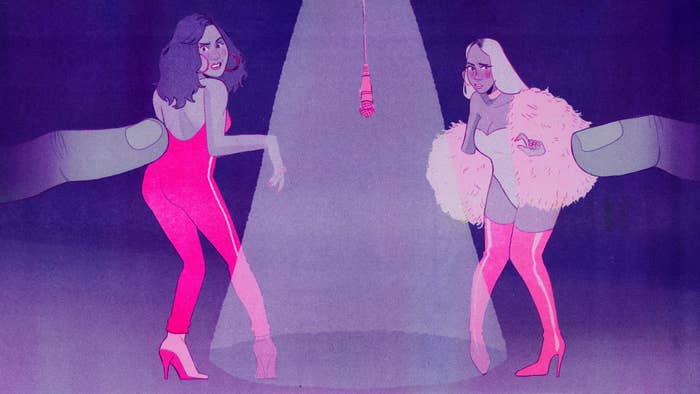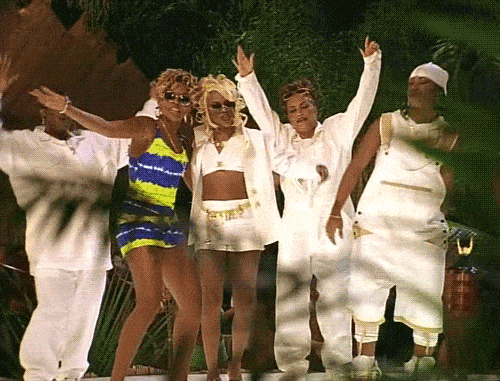“I heard these labels are trying to make another me / Everything you’re getting, little hoe, is because of me.”
Nicki Minaj delivered this pointed jab on London On Da Track’s “No Flag,” which dropped last August. Her whole verse is a thinly veiled Uzi aimed at an up-and-coming female rapper, and not just any new girl—one who bears a striking similarity to her. Everybody with a working brain did the math: light-skinned, physically enhanced, beautiful, theatrical bars, from around the way in NYC. It’s gotta be Cardi B, right? Doesn’t matter either way, because that’s what the internet ran with.
As this assumption spread far and wide, Nicki took to Twitter and insisted no, it was not about Cardi, that she had written the verse well before Cardi really started taking off. But it was enough to convince people that something was brewing. Weeks later, G-Eazy dropped his Billboard Top 10 single “No Limit” featuring ASAP Rocky and Cardi. “My career takin' off, these hoes jogging in place,” she rhymed. “Swear these hoes run they mouth, how these hoes out of shape?” She then drops an indisputable bomb: “Can you stop with all the subs? Bitch, I ain’t Jared.”
It wasn’t long before she was visiting the Breakfast Club for the inevitable interrogation all contributing members of the culture must face. The conversation took a turn for the obvious and Cardi was barraged with a series of questions about the “No Limit” verse and its intended target. "You and Nicki don't have a beef do you?" asked Charlamagne. "No," Cardi replied flatly. Charlamagne pressed further: "Got you. She's just not your cup of tea?" Cardi was visibly flummoxed but kept cool, stating the two had talked and that was that.

The next month, October, Migos dropped “MotorSport” with both Nicki and Cardi, and promptly had everybody thinking the two had subbed each other on the same damn song. The song in which Cardi literally says: “Why would I hop in some beef when I could just hop in a Porsche? / You heard she gon' do what from who? That's not a reliable source.” The words themselves apparently weren’t enough, as speculation of a bubbling beef continued. For the record, before the song dropped, the two had both been spotted jamming to one another’s music, Cardi tweeted lyrics to Nicki’s “Win Again,” and Nicki tweeted a seemingly heartfelt congratulations when Cardi’s “Bodak Yellow” hit No. 1 on the Billboard Hot 100.
Congratulations to a fellow NEW YAWKA on a RECORD BREAKING achievement. Bardi, this is the only thing that matters!!! Enjoy it💕💞🎀 @iamcardib
“I feel like people wouldn’t even be satisfied if me and her was making out on a freaking photo,” Cardi told Complex that October. "I feel like people just want that drama because it's entertaining." Meanwhile, Nicki addressed the beef rumors in a now-deleted string of tweets, saying that men in the hip-hop community are pushing animosity on female rappers. “These are men in our culture who simply refuse to let it go,” she tweeted. “They don’t do this to male M.C.’s.”
She’s right.
Dreezy, a female rapper out of Chicago, says she’s constantly dealing with outsiders reaching to stack her against someone else, purely because of gender. “I always feel like I’m getting compared to other females,” she told Complex. “It’s kind of stupid because they don’t do that to the male counterparts. They all coexist, you feel me?” Elaborating, she pointed to how men have been moving together in the past year. “I think last year might have been one of the years that we had the most collab tapes from artists,” she said. “But when it comes to females, it’s like the pit of death, like crabs in a barrel. We gotta fight for the top type of stuff.”
WHEN IT COMES TO FEMALES, IT’S LIKE THE PIT OF DEATH, LIKE CRABS IN A BARREL. WE GOTTA FIGHT FOR THE TOP...
Oakland’s Kamaiyah feels like beef between women is manufactured by men, as Nicki stated. “You see all the men are widespread in every lane, in every sector,” she began. “They don’t do that. What it is, is that the men are messy and they make the females go against each other. Men be like ‘Ahh, that bitch ain’t fucking with you.’ So now you’re high, you’re like, ‘Fuck that. These hoes ain’t fucking with me. I’m that bitch.’ Now nobody wanna get along because everybody wanna be ‘that bitch.’”
The relationship between men and women in hip-hop reflects the relationships found inside and outside of the general workplace. According to research conducted by the Harvard Kennedy School in 2015, “men behave in a sexist manner towards women in order to remove them from male-dominated spaces, regardless of social status”—an approach called social constructionist theory. The study continues by bringing evolutionary theory into the picture, which explains how sexist behavior is “in response to a threat to a male’s position in a social hierarchy.” As the gender that largely built hip-hop, men have free reign in the genre and—consciously or subconsciously—want to keep it that way. One way this plays out is, when women are pitted against each other, they're occupied and out of the way, ensuring they take up as little space as possible.
Elizabeth Mendez-Berry, a hip-hop critic during the ‘90s, says the belief that there could only be one dominant woman started way back when. “There was a strong sense that there was only room for one woman in the game at any given time,” she wrote me via email. “Or at least one type of woman, so it was Kim or Foxy. There was definitely a moment with Missy and Lauryn and Kim and Foxy and Eve, but I'd say that was the exception rather than the rule.”
Whether it was an anomaly or not, the ‘90s era gave us “Ladies Night,” the 1997 feminist anthem disguised as a Lil’ Kim album cut remix and Nothing to Lose soundtrack feature. In addition to Kim, Missy Elliott, Da Brat, Angie Martinez, and the late Left Eye were featured on the track. When Complex spoke with Missy in January, she reminisced about the collaboration coming together. “To see so many strong, powerful women come together: No egos, and everybody just having fun,” she said. “It seemed like every woman out there came out and supported that record and that moment. I would hope to see that again at some point before we leave this Earth.”
After “Ladies Night,” there wouldn’t be another chart-topping, mainstream rap collab between multiple women in the ‘90s and early 2000s. Missy would duet, so to speak, with another female MC, but the numbers seldom ventured past two. Later, post-2010, songs like Ludacris’ “My Chick Bad” remix with Trina, Diamond and Eve would bring the female-led posse cut back to mainstream. But it took some time to get there again.

Looking back, you can pinpoint the moment when female rap took a hit and things shifted: Missy Elliott got sick. Lil Kim went to jail. Left Eye died. And according to Frannie Kelley, co-host of the Microphone Check podcast and producer of the women-focused music podcast Good As Hell, it got more complicated from there. “Trina was sort of moving between labels,” Kelley said. “She was still around, playing shows, but she wasn’t in the album release cycle conversation. Latifah gets into movies, Da Brat starts doing radio. All of this shit happened in a five year period.”
Kamaiyah remembers things the same way, and figures that the dwindling number of female rappers might be why things have ended up so restrictive today. “The numbers of female rappers went away, so it made it easier for it to make it look like it was only room for one,” she said. “Because if you are the only one, then you have this mentality that there can only be one.” Kamaiyah’s thoughts mirror a 2012 George Mason University study on gender issues and their impact on organizational culture and performance. Research revealed that women are less supportive of other women in conditions where they are both underrepresented in a workplace and feel there are only a few opportunities for advancement. In other words: The smaller the space for women to succeed, the more likely they are to turn on one another for success.
Let’s apply that to hip-hop. Once the leading cast of female rappers dwindled, the space for women in rap restricted by default—if there are fewer women rapping at a prominent level, there’s less room needed for them. That tightened space in the rap landscape was the perfect breeding ground for competition.
Kelley recalls who was there when the dust settled after the pool of female rappers shrunk. “Into that gap comes Nicki [Minaj],” she explained. Nicki, who crossed over from Young Money’s resident female MC to international pop star. Nicki, who passed up Aretha Franklin just last year for most Billboard Hot 100 hits of any female artist, ever. She’s been in the game now for a decade and—despite her current, highly observed absence—she’s working just as hard as she was when she first popped up, pumping out quotable, chart-dominatingfeatures while she readies her upcoming album. If she hasn’t reached it yet, she’s on her way to legit icon status in pop culture, through her style, personality, and of course, bars. She redefined what it means to be a female rapper, and did so in such a major way that it affected every woman entering the game after her. “Everybody that kind of comes up and around her, gets compared to her,” Kelley said.
They’re not even allowed to like, stick a thigh through the door before somebody is like, ‘Who is this bitch trying to come in here and rap that isn’t Nicki Minaj?’
Kid Fury, host of the wildly popular culture commentary podcast The Read, says the Nicki comparisons new female MCs are faced with are unnecessary and unfair. “Women are completely treated differently when it comes to rap,” he said. “They’re not even allowed to like, stick a thigh through the door before somebody is like, ‘Who is this bitch trying to come in here and rap that isn’t Nicki Minaj?’”
Nicki’s presence in rap is so commanding that any woman who tries to follow her is immediately questioned by her army of online fans, the Barbz. Bbymutha is someone who has been dragged into the pit of Nicki comparisons. The Chattanooga rapper released a song called “Rules” last year that generated buzz on social media and YouTube. In addition to praise, it brought about confusing feedback. “People were trying to tell me that I should've sold it to Nicki,” she said. “And I'm just like, why would I have done that? Why? People take what I say the wrong way. I was just like, ‘Nicki couldn't have made a song like this.’ And I said that because it came from a personal place.”
Kid Fury recognizes that women are pushed to compete in ways that men aren’t. “As competitive as rap is, men aren’t given the space to feel threatened by one another like that,” he said. “As many of them can rap over the same beats, have the same colorful dreads, have the same jewelry and piercings and tattoos, and talk about literally the same thing—all this music sounds the same right now.”
According to Frannie Kelley, the mechanics of the rap industry allow this kind of duplication to happen and still lead to viable success for artists who are not so original. “The industry throws resources at middling, mediocre, pointless men, and refuses to throw money at women unless they have proven themselves on a level well past reason,” she said. “And yet they’ve built this entire fanbase and brand for themselves, and a body of work.”
The crux of what is wrong with this game can be explained by, of all people, Chris Rock. To paraphrase him: true equality is the ability to be equally as bad as white people, or in this situation, men in general. Men are afforded the ability to be morally flawed, but they’ll still get a deal, chart high on Billboard, and maintain an undying fanbase. Women can be pristine, spit the hardest bars in the room, be funny AF and/or ooze sex appeal, and will just get a toenail in the door. Men are consistently gallivanting about on tour together, and dropping joint albums left and right; women, meanwhile, are encouraged to stay in their separate lanes, when they’re not being asked to specifically go after each other on wax. Women like Nicki and Cardi, who are both so badass and dominant that they have the world confused about how to handle them at the same time.
If art imitates life, life imitates art. The patriarchal inequities we're currently debating as a society (primarily via the #MeToo movement) are displayed front and center in our female hip-hop stars' jockeying for pole position. The patterns that have taken ahold of society as a whole represent what we’re seeing in hip-hop. Men want their territory, and they’re both surreptitiously and overtly encouraging women to take each other out of the equation so they can keep it. They do this in order to remain confident in their place, and of their own abilities. Women end up aiming to best each other because they know space alongside men is limited. Competition equals survival, and nowhere is that more true than hip-hop. If the way women are positioned in society at large is any indication, a new era of female rappers will still be duking it out long after Nicki and Cardi lay down their mics.

